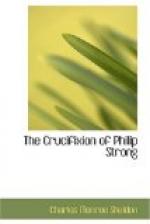CHAPTER IV.
Pursuing the plan he had originally mapped out when he came to Milton, he spent much of his time in the afternoons studying the social and civic life of the town. As the first Sunday of the next month drew near, when he was to speak again on the attitude of Christ to some aspect of modern society, he determined to select the saloon as one of the prominent features of modern life that would naturally be noticed by Christ, and doubtless be denounced by him as a great evil.
In his study of the saloon question he did a thing which he had never done before, and then only after very much deliberation and prayer. He went into the saloons themselves on different occasions. He had never done such a thing before. He wanted to know from actual knowledge what sort of places the saloons were. What he saw after a dozen visits to as many different groggeries added fuel to the flame of indignation that burned already hot in him. The sight of the vast army of men turning into beasts in these dens created in him a loathing and a hatred of the whole iniquitous institution that language failed to express. He wondered with unspeakable astonishment in his soul that a civilized community in the nineteenth century would tolerate for one moment the public sale of an article that led, on the confession of society itself, to countless crimes against the law of the land and of God. His indignant astonishment deepened yet more, if that were possible, when he found that the license of five hundred dollars a year for each saloon was used by the town to support the public school system. That, to Philip’s mind, was an awful sarcasm on Christian civilization. It seemed to him like selling a man poison according to law, and then taking the money from the sale to help the widow to purchase mourning. It was full as ghastly as that would be.
He went to see some of the other ministers, hoping to unite them in a combined attack on the saloon power. It seemed to him that, if the Church as a whole entered the crusade against the saloon, it could be driven out even from Milton, where it had been so long established. To his surprise he found the other churches unwilling to unite in a public battle against the whisky men. Several of the ministers openly defended license as the only practicable method of dealing with the saloon. All of them confessed it was evil, and only evil, but under the circumstances thought it would do little good to agitate the subject. Philip came away from several interviews with the ministers, sad and sick at heart.
He approached several of the prominent men in the town, hoping to enlist some of them in the fight against the rum power. Here he met with an unexpected opposition, coming in a form he had not anticipated. One prominent citizen said:




